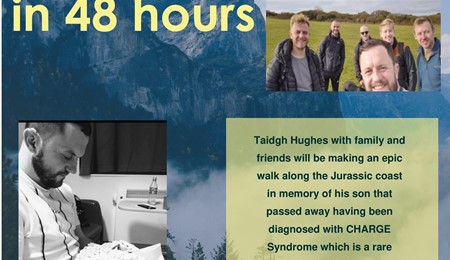2016 should be a good year for the Charge Family Support Group with a national get together in the planning stages (save the date for 17th September!) and many regional meet ups throughout the year to be arranged.
One highlight from last year is that we can proudly announce that Gail Deuce, a member of the Charge Family Support Group committee, has been awarded a Doctorate following her research into the education of children and young people with CHARGE. The committee would like to express its congratulations for such an important piece of work and the dedication that went into producing it.
Rather fittingly, the theme for this edition of the newsletter is education. It is such a huge issue for all of us, whether that journey is just beginning or transitioning towards adult education.
Dr Gail Deuce, has written an excellent and helpful article outlining the main findings of her PhD; well worth a read and a share with your children's teachers as it raises many important considerations regarding the education of children with CHARGE. In addition I have interviewed a teacher from The Royal School for the Deaf in Derby, about the ups and downs of 12 months teaching my daughter Jasmine who was in year 1 last year. I have also pulled together some top tips from the organisation SENSE which highlight what to consider when choosing a school. Finally there are the usual sections; fundraising focuses on the amazing efforts of the Ng family and their marathon running, and there is a reflection on the first ever Scottish family get together…
Any ideas or requests for the next edition in the Spring do email me: estbu@hotmail.com.
I hope you and your loved ones stay well over the remaining winter months..
Educating learners with CHARGE syndrome Dr. Gail Deuce I was introduced to my first child with CHARGE over 20 years ago and have since had the opportunity to work with many other children with CHARGE as a teacher for children who are deafblind/multi-sensory impaired (MSI). These children and young people are some of the most determined, creative and indomitable individuals I have ever met. Working as a teacher with these children and young people has often challenged me to think differently and raised many questions about how we should be working with them and whether learners with CHARGE need a particular educational approach. In a moment of madness, I decided to embark on a PhD to explore the education of this group of very special children and young people and now, having recently completed these studies, here is a brief summary of some of the findings.
There has been much research undertaken relating to the medical aspects of this condition, and also into different aspects of development (e.g. communication, behaviour, social interactions). In contrast, little research has been undertaken relating to the processes and practice of teaching learners with CHARGE (with the exception of Lieberman et al., 2012, who investigated physical education in learners with CHARGE). Although there has been valuable anecdotal reporting it is important that this is complemented and built upon through research-based evidence, especially in the current climate where there is often a requirement for such evidence to secure the necessary provision for a child.
My research was undertaken in two parts; the first involving extracting and analysing statements from 58 educational reports, and the second a questionnaire sent out to teachers with a child with CHARGE in their class, supported by interviews of practitioners working in the deafblind program at Perkins School for the Blind, USA.
The research questions The main research question explored whether, if a child has a diagnosis of CHARGE, it follows that a particular educational approach is likely to be required. This question being: CHARGE syndrome is a medical diagnosis. Can it also be an educational diagnosis? To help address this question a number of sub-questions were also developed, these being:
This study, however, also indicates that the philosophy of deafblind/MSI education will not fully meet the needs of a learner with CHARGE and additional strategies were identified, for example, the implementation of a fine motor skills programme and the provision of alternative recording methods. This suggests there is a need to employ established deafblind/MSI practice in an alternative way or for a different purpose.
It must always be emphasised that the primary focus for educational practitioners must be on the child as an individual. Recognition and consideration, however, also needs to be given to the potential impact of CHARGE on a child’s learning and development where it is diagnosed. Additionally, it was also found to be necessary to attend to the learning environment itself, including the physical location, the people within it and how the curriculum is delivered.
Overall this investigation found that many aspects may be found to be similar for both learners with CHARGE and the wider deafblind/MSI population. It was also suggested however, it is the way the anomalies associated with CHARGE come together and the impact they have, together with a small number of aspects that might be considered more specific to CHARGE that create a distinction between them and other deafblind/MSI learners. A similar conclusion was reached with regard to the teaching strategies employed, and it was again suggested that although the MSI approach provides ‘best fit’ there is a need to implement strategies in an alternative way or for a different purpose, and also that something additional might also be required. Therefore, it is considered that educationally there is something distinct and unique about CHARGE that indicates the need for input from MSI teachers who also have additional knowledge and expertise in the education of children and young people with CHARGE.
I am hoping in due course to publish these findings more formally, and to also provide a series of factsheets for teachers. In the meantime, if you have the stamina and a few wet Sunday afternoons you are very welcome to tackle the full thesis. Be warned though, it is 80,000 words in length! So far, Simon Howard can claim to have read it cover to cover, having proof read it for me before submission. A huge thank you goes to him for this feat, but also to all the families who gave their consent for reports to be shared and persuaded their child’s teacher to complete the questionnaire, and to the teachers who took the time to then fill it in!
References Brown, D. (2011) Deaf- Blindness, Self-regulation and Availability for Learning: Some thoughts on educating children with CHARGE syndrome. California Deaf-Blind Services resources, 16: (3): 1-7 Lieberman, L.J., Haibach, P. and Schedlin, H. (2012) Physical education and children with CHARGE syndrome: research to practice. Journal of Visual Impairment and Blindness. 106: (2): 106-119 Majors, M.M. (2011) “Educational Considerations for students with CHARGE syndrome”. In: Horsh, U. and Scheele, A. (eds) (2011) Compendium on CHARGE syndrome: Multi-disciplinary and International Perspectives. Hamberg, Germany: Median-Verlag von Killisch-Horn GmbH. pp. 201-212
My daughter has attended the Royal School for the Deaf for 3 years. We moved to derby in 2012 specifically in search of a bigger deaf/signing community and an excellent deaf school. We haven’t been disappointed. In the hope of sharing insights and experience I have interviewed a teacher who worked closely with Jasmine in her first year.
How long have you been teaching at RSDD?
I started at RSDD a year ago, before that I had been teaching in Mainstream as a Head of KS1 in Nottinghamshire for the last 10 years and prior to that I taught overseas and in London.
Have you ever taught a child with CHARGE syndrome before? (And will you be willing to do so again??)
LOL…never to the first part and absolutely to the second! Teaching a child with CHARGE has been a learning curve, but no different to teaching any other child. Getting to know individual characteristics and personality traits is vital to getting the best out of every child…Jasmine has been no different!
You attended the family day in Coventry in the autumn. Was that helpful and does anything stand out that you were able to take away?
For us the day was really good. Although we’d researched CHARGE it was lovely to hear first-hand experiences from parents and experts. We learnt a lot of practical ideas as well as making contacts for further research.
Can you describe some of the struggles and successes you've encountered teaching Jasmine?
It became very apparent early on that having a pretty structured day really suited Jasmine. She likes to know what is happening now and what will be happening next (We use visual timetables to help her and the rest of the group to support this and they use it regularly to see what’s happening that day.) We also found that using practical/multi-sensory resources also helped. Jasmine loves using things like sand, dried coloured rice and wet porridge to explore/play with. We use things like this regularly to give her the opportunity for some ‘time out’ and as part of a calming strategy (The house-keeping team are very used to cleaning up rice that has been thrown across the room or walls splattered with goo/cold porridge these days!) One of Jasmines weekly ‘high-lights’ is cooking. We try and ensure that whatever we make is ‘hands-on’ and that the ingredients being used are edible raw…as well as the multiple ‘academic’ skills being developed through
this, the social skills around sharing and taking turns has proved to be imperative! (Cooking has also proven to be a perfect carrot/stick tool both as part of the school day and at home!) As part of behaviour management in any classroom I’ve always set up a den/dark area for children who are finding life a tad difficult/need time away from classroom life to calm down. This has been a brilliant resource for Jasmine to tap into and she uses it daily. It’s really important for her to recognise that it’s not as a punishment but as a tool to allow her to calm down…she likes to choose another child to be in charge of the sand-timer and will (usually!) go in without complaint! One of the main ‘challenges’ with Jasmine is her ability to copy other children’s (and staff’s!) behaviour. It has to be said that Jasmine has a much greater desire to follow bad choices seen happening around school…we spend a great deal of time talking to her about what the right choice would be but this (in her mind!) is often far less fun then the negative choice! As staff we also have to be very careful to ensure that Jasmine remembers she is one of the children and not a member of the teaching team…many a fall out has occurred with peers when Jasmine tries to step into an adult role and tell others what to do! On reflection however the ‘struggles’ we have with any child can normally be learnt from and strategies put in place to lessen the impact/defuse the situation next time!
From her perspective what do you think she finds hard about being in the classroom / school environment? This is a difficult one. Although we try hard to adapt the curriculum to suit our children’s needs/learning styles, there are times when Jasmine simply needs to sit down and write, read, record her work. These are the times when she needs lots of support (Partly to avoid distraction from ANYTHING occurring around her) When tired, we try really hard to adapt what we’re doing to make things practical or to ensure she has some time out…these are often the times when her behaviour worsens or work is not completed.
How often does she make you laugh?... And how often does she scare you when armed with scissors and glue?? All the time is the easy answer to the first part! Jasmine has a brilliant sense of humour (as well as a very vivid imagination!) She loves communicating and once on a roll it’s very hard to stop her. This year she has formed a huge passion for another member of the group and her ‘sneaky’ methods to find ways of sitting /being with him has had us all in stitches! Scissors and erratic signing combined often mean staff having to duck and dive but (touch wood!) we’ve all come out unscathed…it’s remembering to ensure a change of clothes if you plan to do anything sociable out of school after a painting session!!!!
It is my perspective that you have had a lot of freedom to adapt lessons and routines to Jasmine's needs which has been invaluable. What would be your top tips for teachers who are new to teaching a child with CHARGE syndrome? We’ve been really lucky to have a very understanding and realistic Head of Primary at RSDD, who fully supports our professional knowledge and relationships with the children. This means that ‘thinking out the box’ is not only valued but fully encouraged…the more creative/hands on work planned the better and the understanding that there are times when you need to scrap what you’ve planned and adapt to the mood/interests of the children.
Are there any other professionals who have given helpful insights over the year? The internet is a wonderful place these days to find case studies and ideas to adapt learning/the environment, and we have lots of professionals who visit children with resources. I really believe however that the best person to teach me how a specific child learns is the child themselves. Taking five minutes occasionally to simply sit and watch them interacting with others/resources in the classroom is far more informative than reading/listening to generic advice!
Is there anything parents can do which would be a help rather than a hindrance in supporting you teaching a child with CHARGE syndrome? Good relationships, communication and honesty between staff and any parent is imperative. With any child there will always be events/situations that will have a
positive or negative affect on behaviour/self-esteem/characteristics, but with Jasmine these are often more extreme! Knowing that she’s had a bad afternoon in school/has had little sleep the night before means that things can be adapted to prevent further issues! Remembering the positives is also really important…even in the worst days/weekends with any child there will always be something worth celebrating!
Many thanks to Nancy for her insights. If you have any ideas about further interviews you would like to see in the newsletter do get in touch!
Choosing a school or other setting (downloaded from SENSE – www.sense.org.uk) A frequent discussion among the parents of children with CHARGE syndrome is how to choose a school and get the most out of that school. Sense have some excellent advice on their website which I have included below. Sense says ‘A school or other setting for your child is a very personal decision. You might want to think about some of the following points. Some of the questions clearly have right or wrong answers, but many do not - they depend on your preferences and your wishes for your child.’
Questions to ask.
Are staff interested in your child as an individual? Are they interested in your knowledge of your child?
How does home-school liaison work? How easily can you visit?
How do staff interact with your child on first meeting him or her? How do they end the interaction? Are you happy with their attitude and style of interaction? How does your child react to them?
What resources does the provision have? Qualified specialist teachers? Access to medical and therapy staff if appropriate? Other specialist resources?
Who will be working with your child? If they don't yet know, how will they decide? What are the staffing ratios (how many children for each member of staff)?
How do staff describe the main aims of the provision?
How much do staff know about deafblindness? What training have they had in multisensory impairment? Does your child's teacher have the mandatory qualification in the education of children who are multi-sensory-impaired?
Are there other children with similar needs to your child?
Communication What communication systems are used? Who will your child be able to communicate with? Staff? Peers? Other people?
How will information be presented to your child? How much choice will your child get regarding activities?
Is the physical environment appropriate? Will your child be helped or hindered in seeing, hearing, moving about? Is appropriate special equipment available?
Are there local community links, for example with other schools? Other inclusive activities?
Will your child be as fully included in society as is compatible with meeting his or her needs?
Do you feel comfortable and welcome?
For more information on various issues ranging from types of provision available, resources for teachers, advice on Education and Health Care Plans etc etc do visit www.sense.org.uk. The National deaf children's society also has a good website and its parents forum can be particularly enlightening.. www.ndcs.org.uk
Regional ‘get togethers’ - Scotland's first!
The first ever Scottish family day was held this summer, at the Sense Base in Glasgow. It was a successful day with 8 families meeting up and sharing stories and experiences. The day began with Sense Scotland telling us all about their services and what they can offer us. The children were all in the creche and entertained by the fantastic Sense volunteers. We had lovely speakers, including 2 adults with CHARGE, and also a parent who shared her story of bringing up a child with CHARGE. It was really interesting (and emotional) to hear the different perspectives. In the afternoon there was a less formal element to the day, and it gave all families a chance to mix and get to know each other over lunch and cake!
It was lovely to see so many CHARGE families under one roof, and both children and adults had a great time. Everyone said that these events would be greatly received on an annual basis so we are all looking forward to meeting up next year!!!
(note from Ed: online fundraising has now raised over £40!)
Fantastic Fundraising from the Ng family!
On Oct 21, 2015 Jenny Ng announced this amazing news: So...13.1 miles have been run (well a bit of walking/hobbling during the last couple miles!), nearly 100 supporters have donated and the grand total raised to date is £2,566.89! Jemma and Steven wanted to share this video with you that they put
together for me to send to all the supporters :https://dl.dropboxusercontent.com/u/113241/IMG_5198.MOV I've also attached a couple photos - incase you want proof of me crossing the finish line, haha - and of our real little winner Eva receiving her medal!
A still rather tired Jenny.
Contact Details.
CHARGE Family Support Group Website http://www.chargesyndrome.org.uk
Lydia Howarth (Chair) Telephone: 020 8932 6824 Email: lydia@howarthonline.net
Simon Howard (Vice Chair) Telephone: 020 8265 3604 Emails: si_howard@hotmail.com
Any problems with my email please my alternate email address simonthoward@googlemail.com
Frances Concannon (Secretary) Telephone: 01732 363411 Email: francesmconcannon@gmail.com
The views expressed in this newsletter are not necessarily those held by the CHARGE Family Support Group.
INFORMATION SHEET
Name of person with CHARGE
Address
Email address
Telephone No
DoB
Parent’s names
Address if different from above
Email address if different from above
Telephone No if different from above
Main Issues:
Please return to Simon Howard, 59 Elmer Road, London SE6 2HA or si_howard@hotmail.com

Posted on Wednesday 6 April 2022
CHARGE syndrome, which affects approximately one in 10,000 newborns worldwide, is associated with neurological and behavioural conditions like intellectual disability, attention deficit disorder, conv…

Posted on Tuesday 22 March 2022
A teenager who helped thousands of people learn British Sign Language (BSL) during the first Covid-19 lockdown is being turned into an animated character in new lessons.

Posted on Tuesday 11 January 2022
Taidgh Hughes with family and friends will be making an epic walk along the Jurassic coast in memory of his son that passed away having been diagnosed with CHARGE Syndrome which is a rare genetic dise…

Posted on Tuesday 8 December 2020
Study looking at a range of behaviours, skills and impairments in CHARGE syndrome.